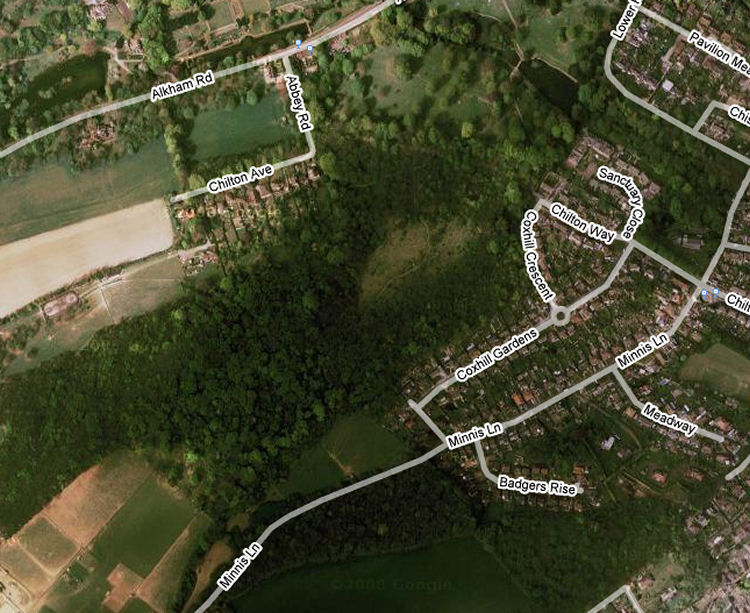|
Dover Express 20 September 1901.
COUNTY SESSIONS. ANNUAL LICENSING DAY.
The County Petty Sessions, which were also the adjourned sitting to deal
with licensing business, were held yesterday at the Town Hall. Dover,
before Messrs. G F. Fry, (in the chair), W. J. Adcock, J. L. Bradley, T.
A. Terson, G. E. Toomer, H. M. Baker, W. H. Burch Rosher, Capt. Palliser,
and Major R. B. Lawes.
RESIDENTIAL HOTEL FOR THE KEARSNEY PARK ESTATE.
An application for a provisional license for a new hotel to be built at
Chilton, in the Alkham Valley, was made by Sir William Crundall, Mr.
Rutley Mowll appearing for the applicant. Mr. A. M. Bradley opposed, on behalf of Messrs. G. and A. Clark, and
also on behalf of the Rev. A. R. Jackman, Vicar of Alkham.
Superintendent Holland also opposed on behalf of the Police. Mr. Rutley Mowll said that Sir William Crundall, in order to
open up the
new estate he has recently purchased in the Alkham Valley at Chilton,
proposed to erect a first-class residential hotel, at a cost of four or
five thousand pounds, in order to attract visitors to the locality, with
the hope that charmed by the beautiful scenery around the Kearsney Park
Estate, they would become purchasers of plots of land there, and erect
villa residences, a number of which Sir William Crundall also proposed
to build. Mr. Beeston, Architect, practicing at Dover, produced plans, showing the
front elevation of the proposed premises. The cost would be £4,500. In reply to Mr. Bradley, witness said the public refreshment room at the
back had a separate entrance. What is this for—liquid refreshment? For the accommodation of casual visitors who don’t intend to stay in the
hotel. The dining room is intended for those who stayed at the hotel. In
the refreshment room chops, etc., would be served. Mr. Burch Rosher:- Is it to contain a bar? Witness: No. Sir William Henry Crundall next gave evidence. He said that what he
intended to put up was simply and purely a residential hotel. He had 500
acres of land there, and his object was to develop that land for
building villas. The object of the hotel was to induce people to come
down, and on their seeing the beauties of the place to turn them from
ordinary visitors into residents. The class of villas he proposed to
erect would be guided by circumstances, but he should like to build
houses at from £50 to £100 rentals. Mr. Mowll:- It is suggested that this is to be an ordinary public house.
Would you like to have one there? Sir William Crundall:- I should think it would be ruination. I am not
likely to carry it on as a public house. Mr. Bradley, in cross-examination, asked if Sir William Crundall would
accept a license conditional on there being no bar. Sir William Crundall said he could not guarantee that he would own the
house always. The Chairman said that they could not do that. They had only power to
either refuse the application or to grant it. Mr. Bradley said he did not object to residential hotel. He suggested
that if an understanding were given that a bar be not added the license
could be refused when renewal was applied for if a bar were added. The Chairman:- We had the same thing at the
"Grand." Mr. Bradley:- We had a promise, which was not fulfilled. In reply to the Bench, Sir William Crundall said that it was his
intention to commence building the hotel in a reasonable time, but the
work would take 18 months to complete. For the opposition. The Rev. A. R. Jackman, Vicar of Alkham, was called by Mr. A. M.
Bradley, and presented a memorial signed by 101 inhabitants out of 121
houses in the parish. Cross-examined. Witness said he should not object to a residential hotel
without a bar. Mr. G. Clark also gave evidence in opposition to the application, as he
believed there would be a bar. This completed the case. The Bench retired, and on the return the Chairman said that the Bench
though they did not “bar’’ a private bar, were unanimously of opinion to
grant the licence provided Sir William Crandall gave an undertaking not
to put in a public house bar, and to do all in his power to prevent any
lessee doing so. Mr. Rutley Mowll, on behalf of Sir William Crundall, said he was
prepared to undertake that there should be no public house bar in the
sense that he understood the words. |
